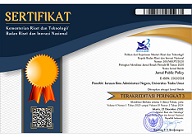Dampak Inovasi Teknologi Terhadap Kinerja Keuangan Perusahaan Manufaktur di Indonesia
Abstract
Keywords
Full Text:
PDFReferences
Ansoff, H. I. (1965). The concept of strategy. McGraw-Hill: New York, NY, USA.
Artz, K. W., Norman, P. M., Hatfield, D. E., & Cardinal, L. B. (2010). A longitudinal study of the impact of R&D, patents, and product innovation on firm performance. Journal of product innovation management, 27(5), 725-740.
Belderbos, R., Carree, M., & Lokshin, B. (2004). Cooperative R&D and firm performance. Research policy, 33(10), 1477-1492.
Bhatt, P., Ahmad, A. J., & Roomi, M. A. (2016). Social innovation with open-source software: User engagement and development challenges in India. Technovation, 52, 28-39.
Budiharjo, R. (2020). Effect of environmental performance, good corporate governance and leverage on firm value. American Journal of Humanities and Social Sciences Research, 4(8), 455-464.
Butler, J. B., Henderson, S. C., & Raiborn, C. (2011). Sustainability and the balanced scorecard: Integrating green measures into business reporting. Management accounting quarterly, 12(2), 1.
Carvalho, A. D. P., Zarelli, P. R., & Dalarosa, B. M. (2018). Eco-innovation typology for incubators. World Journal of Entrepreneurship, Management and Sustainable Development, 14(3), 291-308.
Choi, Y. S. (2022). A New Frontier of Digital Competition Law. 법학연구, 25(2), 67-97.
Dossi, A., & Patelli, L. (2010). You learn from what you measure: financial and non-financial performance measures in multinational companies. Long Range Planning, 43(4), 498-526.
Ehie, I. C., & Olibe, K. (2010). The effect of R&D investment on firm value: An examination of US manufacturing and service industries. International Journal of Production Economics, 128(1), 127-135.
Eng, L. L., & Shackell, M. (2001). The implications of long-term performance plans and institutional ownership for firms' research and development (R&D) investments. Journal of Accounting, Auditing & Finance, 16(2), 117-139.
Erica, X., & y Laura, L. (2012). XL Intangible assets and cross-sectional stock returns: evidence from structural estimation (Vol. 3, No. 1, pp. 68-79). working paper.
Fernando, S., & Lawrence, S. (2014). A theoretical framework for CSR practices: Integrating legitimacy theory, stakeholder theory and institutional theory. Journal of theoretical accounting research, 10(1), 149-178.
Gassmann, O., Enkel, E., & Chesbrough, H. (2010). The future of open innovation. R&d Management, 40(3), 213-221.
Guo, Z., Hou, S., & Li, Q. (2020). Corporate social responsibility and firm value: the moderating effects of financial flexibility and R&D investment. Sustainability, 12(20), 8452.
Hagedoorn, J. (1996). Innovation and entrepreneurship: Schumpeter revisited. Industrial and corporate change, 5(3), 883-896.
Hersugondo, H., Pertiwi, S. N. A., & Udin, U. (2019). Corporate social responsibility and corporate value: Evidence from an emerging economy, Indonesia. Calitatea, 20(172), 51-55.
Johnson, L. D., & Pazderka, B. (1993). Firm value and investment in R&D. Managerial and Decision Economics, 14(1), 15-24.
Ku, Y. L., Liau, S. J., & Hsing, W. C. (2005). The high-tech milieu and innovation-oriented development. Technovation, 25(2), 145-153.
Lee, M., & Choi, M. (2015). Analysis on time-lag effect of research and development investment in the pharmaceutical industry in Korea. Osong Public Health and Research Perspectives, 6(4), 241-248.
Marques, J. P. (2014). Closed versus open innovation: evolution or combination?. International Journal of Business and Management, 9(3), 196.
Min, B. S., & Smyth, R. (2016). How does leverage affect R&D intensity and how does R&D intensity impact on firm value in South Korea?. Applied Economics, 48(58), 5667-5675.
Na, Y., & Hong, S. H. (2011). An empirical analysis on value relevance of corporate social responsibility activities by firm size. Korean Accounting Journal, 20(5), 125-160.
Rahman, H., & Ramos, I. (2010). Open Innovation in SMEs: From closed boundaries to networked paradigm. Issues in Informing Science and Information Technology, 7(4), 471-487.
Rakhiemah, A. N., & Agustia, D. (2009). Pengaruh kinerja lingkungan terhadap corporate social responsibility (CSR) disclosure dan kinerja finansial perusahaan manufaktur yang terdaftar di Bursa Efek Indonesia. Simposium Nasional Akuntansi XII, 4-6.
Reinganum, J. F. (1985). Innovation and industry evolution. The Quarterly Journal of Economics, 100(1), 81-99.
Rogers, M. (1998). The Definition and Measurement of Innovation.
Rong, Z., & Xiao, S. (2017). Innovation‐related diversification and firm value. European Financial Management, 23(3), 475-518.
Rusmana, O., & Purnaman, S. M. N. (2020). Pengaruh pengungkapan emisi karbon dan kinerja lingkungan terhadap nilai perusahaan. Jurnal Ekonomi, Bisnis, Dan Akuntansi, 22(1), 42-52.
Sapulette, S. G., & Limba, F. B. (2021). Pengaruh penerapan green accounting dan kinerja lingkungan terhadap nilai perusahaan manufaktur yang terdaftar di BEI tahun 2018-2020. Kupna Akuntansi: Kumpulan Artikel Akuntansi, 2(1), 31-43.
Sawitri, A. P. (2017). Analisis pengaruh pengungkapan akuntansi lingkungan dan kinerja lingkungan terhadap nilai perusahaan. In Seminar Nasional & Call For Paper, FEB Unikama Malang,(4) (pp. 1-11).
Sawitri, N. K. U., & Wahyuni, M. A. (2021). Pengaruh Good Corporate Governance dan Modal Intelektual Terhadap Nilai Perusahaan. JIMAT (Jurnal Ilmiah Mahasiswa Akuntansi) Undiksha, 12(2), 601-614.
Schmidthuber, L., Piller, F., Bogers, M., & Hilgers, D. (2019). Citizen participation in public administration: investigating open government for social innovation. R&d Management, 49(3), 343-355.
Seo, R. J., & Kim, J. S. (2011). Technology Innovation, Market Share and Firm Value in the Panel of Korean Manufacturing Firms. J. Ind. Econ. Bus, 24, 3211-3226.
Tambalean, F. A. K., Manossoh, H., & Runtu, T. (2018). Pengaruh kepemilikan manajerial dan kepemilikan institusional terhadap nilai perusahaan pada perusahaan sektor industri barang konsumsi di BEI. Going Concern: Jurnal Riset Akuntansi, 13(04).
Zandi, G. R., Khalid, N., & Islam, D. M. Z. (2019). Nexus of knowledge transfer, green innovation and environmental performance: impact of environmental management accounting. International Journal of Energy Economics and Policy, 9(5), 387-393.
DOI: https://doi.org/10.35308/akbis.v0i0.11498
Refbacks
- There are currently no refbacks.





